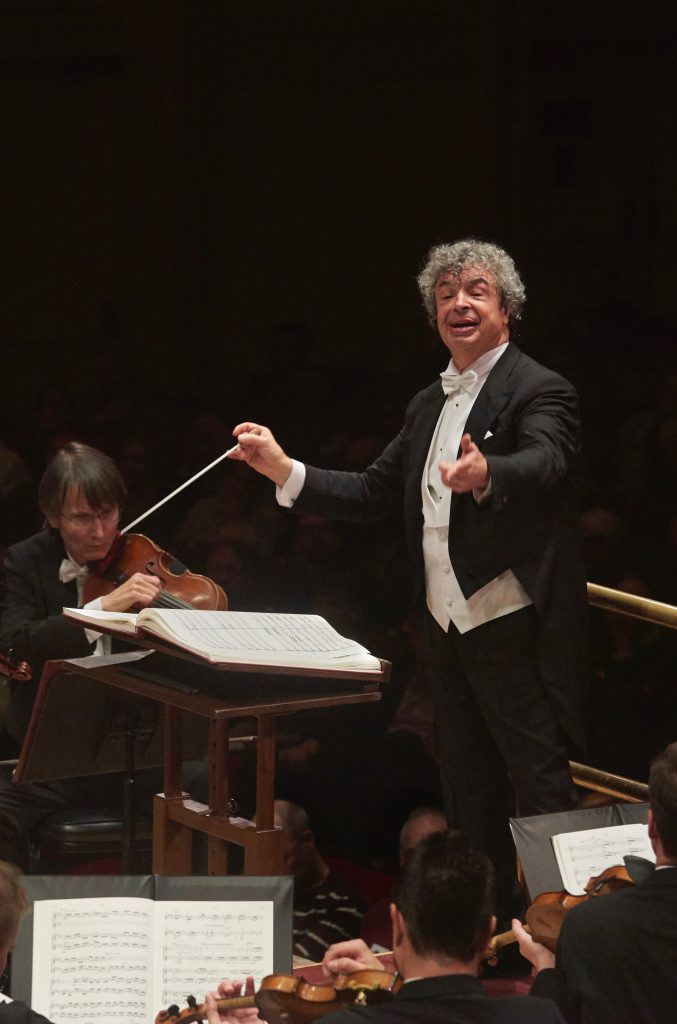Czech Philharmonic stakes a Mahler claim with a memorable “Resurrection”

Semyon Bychkov conducted the Czech Philharmonic in Mahler’s Symphony No. 2 Sunday at Carnegie Hall. Photo: Stefan Cohen
There are three orchestras considered great Mahler ensembles: the Vienna Philharmonic, the Royal Concertgebouw Orchestra and the New York Philharmonic. Each had a personal connection to the composer — Mahler led both the VPO and the New York Philharmonic, and was close with Willem Mengelberg, who led the RCO in performances of Mahler symphonies that the composer himself admired. All three orchestras have deep institutional knowledge of Mahler.
But there is another that deserves to be in this company: the Czech Philharmonic. Mahler did premiere his Symphony No. 7 with this orchestra, but beyond that there is a great deal to be said about both the composer and the orchestra being Bohemian.
The Czech group always had a unique national sound, with bucolic winds and unusually warm, soft timbres coming out of the horn and brass sections. And then there is the landscape. As much as Mahler’s journeys are psychological, so do they traverse roads, forest, meadows, rivers — the countryside through which he obsessively hiked. Mahler is the sound of landscape, as is the Czech Philharmonic, and the two combined with conductor Semyon Bychkov Sunday afternoon in Carnegie Hall to deliver an exceptional performance of the “Resurrection” symphony (No. 2).
Bychkov’s way with Mahler is natural in that everything seems just right — unforced, organic, even effortless. On Sunday, Mahler’s musical storytelling unfolded and grew as time elapsed, from the accumulation of events in the opening Allegro maestoso — some of the most linear music ever composed — and onward, with a sensation of being pulled downriver by a strengthening current.
Conductor and orchestra were precise and masterful about every detail in the score. Bychkov even took the rarely observed five-minute pause after the first movement, which Mahler called for in expectation that the audience would need to recover from the intensity and scope of what they had just heard.
This was Mahler delivered with utmost musicality, care, and understanding. Every tempo felt perfect, from the deliberate walking pace to start, to the slow ländler of the second movement, to the speed of the vocal phrases in the phantasmagorical final movement. Dynamics were exquisitely refined and shaped, with rises and falls that felt like the orchestra was slowly breathing. Even big moments, like the great dissonant crisis and crashing cadence in the first movement — places where most conductors show their stuff — were the natural, logical result of where the score had come to. On this occasion, Bychkov pushed the tempo only slightly faster, and that ramped up an explosive, gripping tension.
The following cadence was jolting, and for all the refinement of the playing, the moments of greatest intensity were still piercing, raucous, loud and true to the music. The great mashup in the scherzo was biting, while the closing chord to the whole symphony was not so much loud as it was like the brightest sun refracted through stained glass, each color illuminated, each note stacked in perfect intonation.
Mezzo-soprano Elisabeth Kulman, who had been visibly soaking in all the orchestral playing, stood and sang a glowing, gentle “Urlicht.” Her voice was wonderfully well integrated with the orchestra. That technical balance was another quality of this performance, where everything mixed in just the right measure.
The Prague Philharmonic Choir sat for most of their turns, only standing after soprano Christiane Karg sang “O Glaube.” Karg herself remained seated as she sang “Aufersteh’n” with the chorus. The voices literally rising out of the orchestra produced a sound like dusk’s golden hour.
Kang’s silvery, rounded quality was an ideal musical and dramatic contrast to Kulman. But the vocal solos are relatively brief — the chorus is the major factor and, as prepared by Lukáš Vasilek, they were superb. As with the orchestra, their sound, with the men, women, and various ranges clearly delineated inside an integrated, larger texture, was gorgeous, and it was Mahler’s sound.
Around all this was the constant flow of the dramatic and musical journey of Mahler’s anonymous protagonist. Beginning in darkness and finding its way to light, the unaffected naturalness of the playing delivered a ne plus ultra Mahler experience.
The Mariinsky Orchestra and conductor Valery Gergiev perform Tchaikovsky’s Nutcracker at Carnegie Hall, 8 p.m., Wednesday carnegiehall.org


